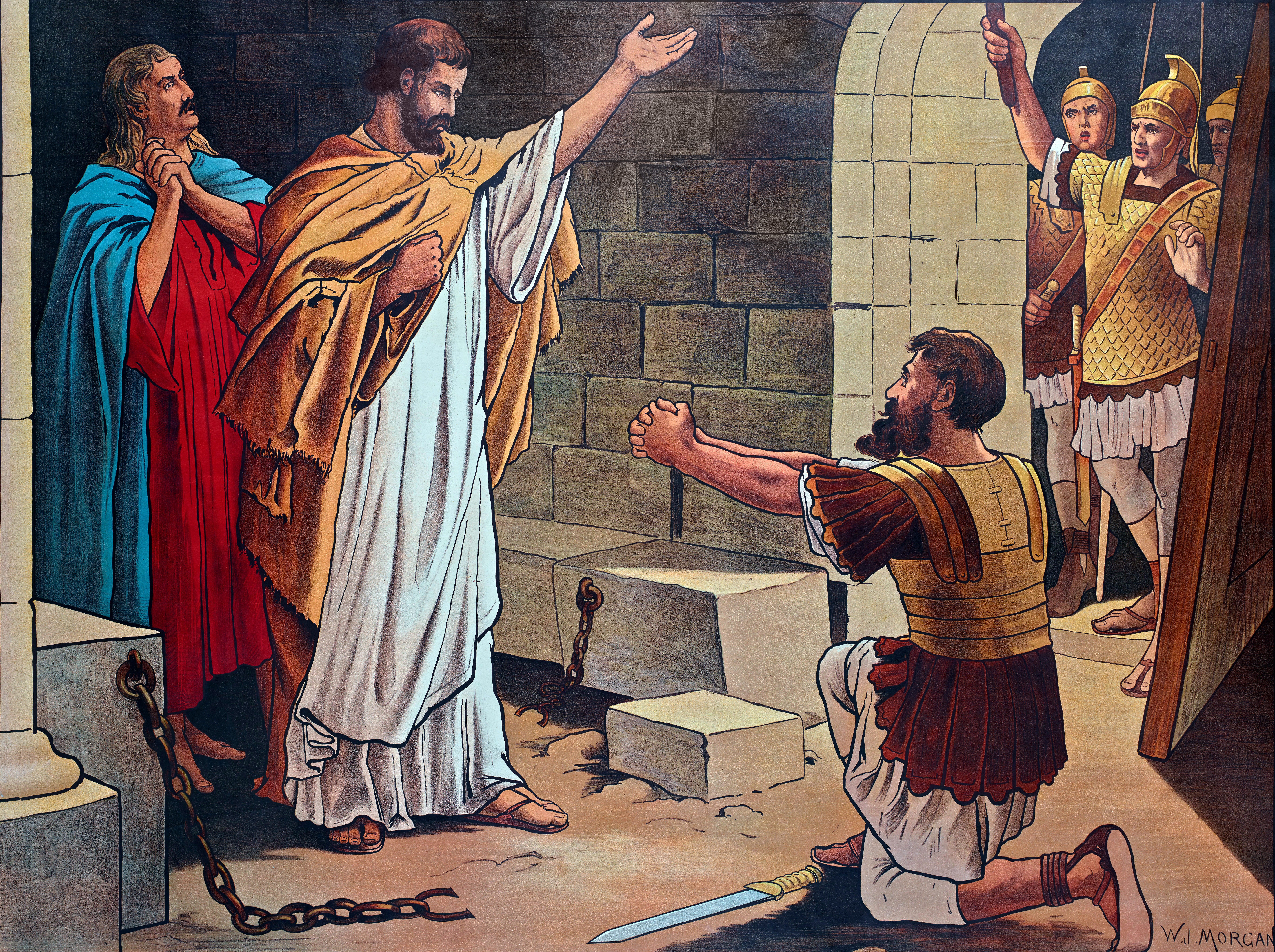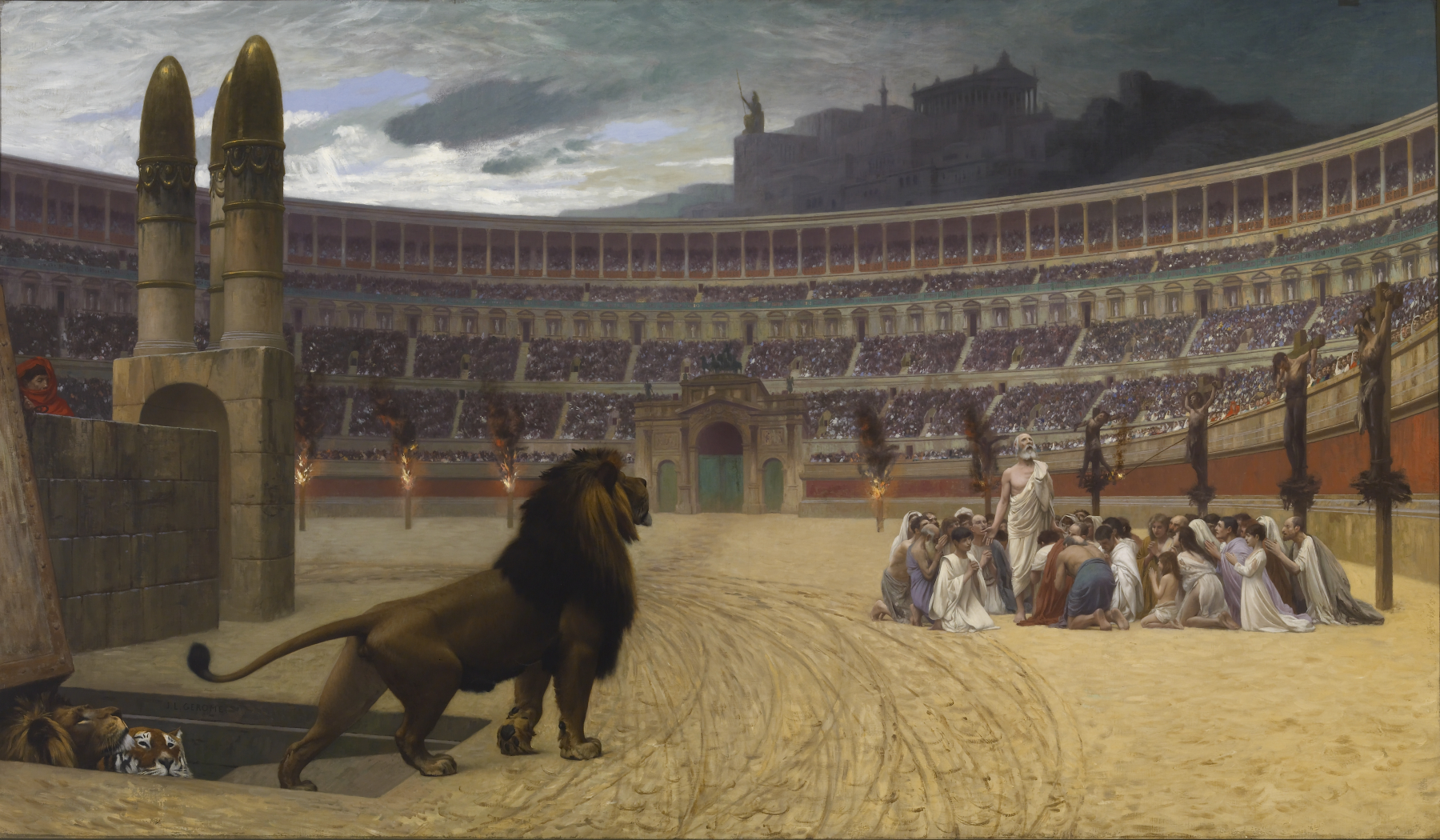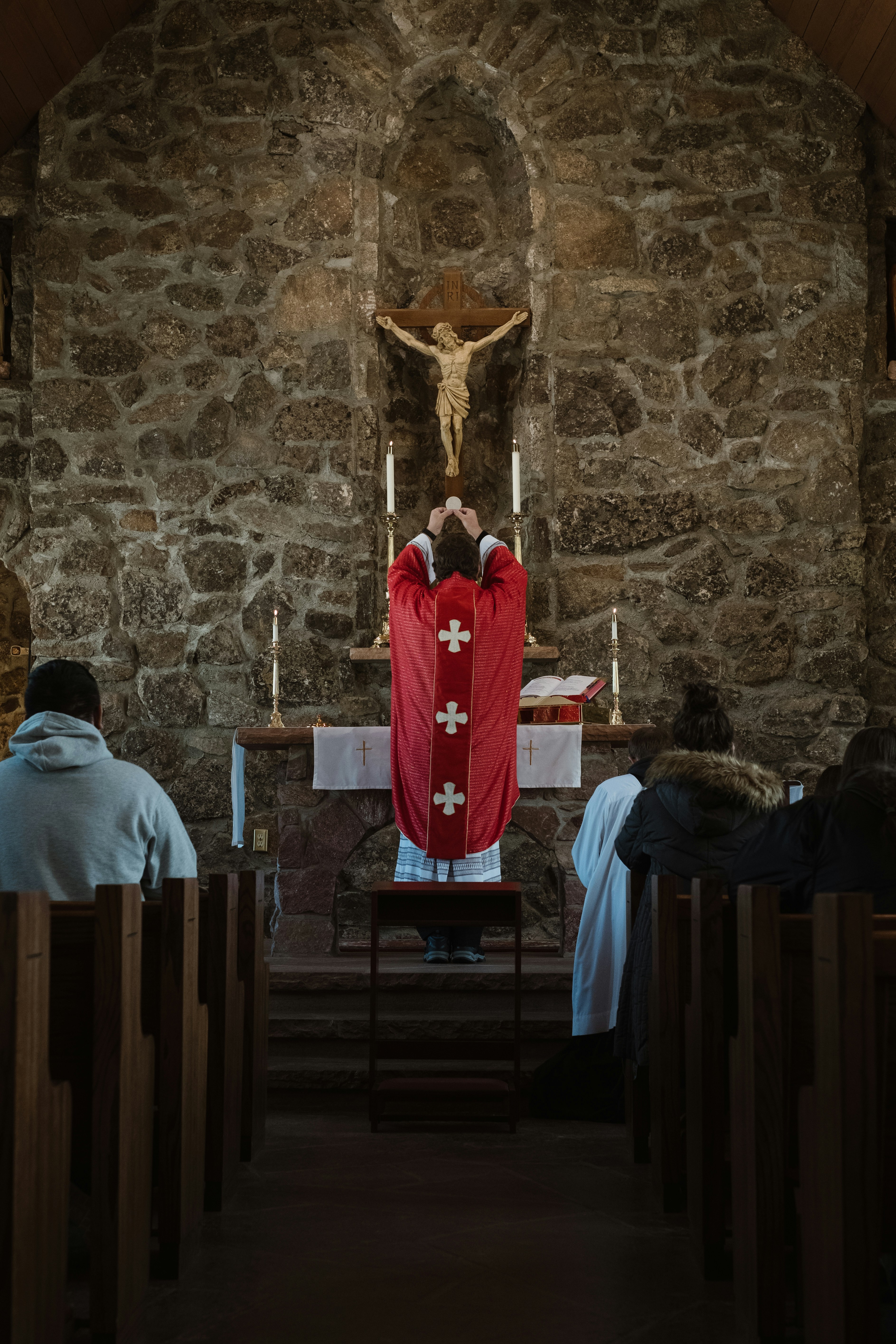I had a difficult time deciding which reading to expound on today. They both have great things to say, but I chose the first reading from Acts.
The scene opens up with Paul and Silas being severely beaten by the jailers. Then they are dragged into a cell and chained to a stake. If they are already locked up in a cell at the far end of the building, why are they also chained to a state? I guess they did not want them walking around in the cell, just a further punishment. But wait! Laying there in pain and agony they burst into joyful songs of praise! After imagining this scene, I ask myself what I would do under these circumstances. I would probably be whining and moaning about what had just happened to me. But I can hear Paul and Silas singing from my prayer chair.
So what happens next? A mighty earthquake makes the building tremble and the cell doors fly open. Their chains of bondage fall off! The ruckus woke the jailer. He saw what had happened and knew what would happen to him. He drew his sword and was ready to take his own life when Paul yelled out, “Do not harm yourself; we are all here” The jailer ran to Paul and Silas and asked them, “Sirs, what must I do to be saved”? Why in the world would he react by saying that? It seems to me that he probably knew that Paul and Silas were holy men. He must have felt like the earthquake was a punishment from God, yet He allowed the jailer and his cohorts to survive. I love Paul’s answer, “Believe in the Lord Jesus and you and your household will be saved”!
This gives me great hope. I have asked you all before if you and I are all in. Have we totally given ourselves to the Lord? Do we truly believe in Him? I have been working on this for some time and I believe that I’m at least 11% there. God promises that if you believe, “you and your household will be saved.” I choose to believe that this includes those of our household that may be on the streets (like my youngest son), distant or isolated. This is a great time to be all in. Will you join me?
Serving with joy!
Me costó decidir sobre cuál lectura escribir hoy. Ambos tienen grandes cosas que decir, pero elegí la primera lectura de los Hechos.
La escena comienza con Pablo y Silas siendo golpeados brutalmente por los carceleros. Luego son arrastrados a una celda y encadenados a una estaca. Si ya están encerrados en una celda en el otro extremo del edificio, ¿por qué están también encadenados a una estaca? Supongo que no querían que anduvieran por la celda, y era simplemente un castigo más. ¡Pero esperen! ¡Allí tumbados, con dolor y agonía, estallan en alegres cantos de alabanza! Después de imaginar esta escena, me pregunto qué haría yo en estas circunstancias. Probablemente estaría gimiendo y lamentándome por lo que me acaba de pasar. Pero puedo oír a Pablo y Silas cantando desde mi silla de oración.
Después ¿qué sucede? Un poderoso terremoto hace temblar el edificio y las puertas de la celda se abren de golpe. ¡Las cadenas de sus ataduras se caen! El alboroto despertó al carcelero. Vio lo que había sucedido y sabía lo que le sucedería. Sacó su espada y estaba listo para quitarse la vida cuando Pablo gritó: “No te hagas ningún daño; aquí estamos todos”. El carcelero corrió hacia Pablo y Silas y les preguntó: “¿Qué debo hacer para salvarme?” ¿Por qué reaccionaría diciendo eso? Me parece que probablemente sabía que Pablo y Silas eran hombres santos. Debe haber sentido que el terremoto era un castigo de Dios, pero Él permitió que el carcelero y sus cómplices sobrevivieran. ¡Me encanta la respuesta de Pablo!: “Cree en el Señor Jesús y te salvarás, tú y tu familia”.
Esto me da una gran esperanza. Les he preguntado a todos anteriormente si ustedes y yo estamos completamente entregados. ¿Nos hemos entregado totalmente al Señor? ¿Creemos plenamente en Él? He estado trabajando en esto por mucho tiempo y creo que estoy al menos a un 11%. Dios promete que si crees, “tú y tu casa seréis salvos”. Elijo creer que esto incluye a aquellos miembros de nuestra familia que pueden estar en la calle (como mi hijo menor), lejos o aislados. Este es un gran momento para estar completamente entregados. ¿Te animas a unirte conmigo?
¡Sirviendo con alegría!
 Deacon Dan Schneider is a retired general manager of industrial distributors. He and his wife Vicki have been married for over 55 years. They are the parents of eight children and thirty-one grandchildren. He has a degree in Family Life Education from Spring Arbor University. He was ordained a Permanent Deacon in 2002. He has a passion for working with engaged and married couples and his main ministry has been preparing couples for marriage.
Deacon Dan Schneider is a retired general manager of industrial distributors. He and his wife Vicki have been married for over 55 years. They are the parents of eight children and thirty-one grandchildren. He has a degree in Family Life Education from Spring Arbor University. He was ordained a Permanent Deacon in 2002. He has a passion for working with engaged and married couples and his main ministry has been preparing couples for marriage.
Featured Image Credit: Walter Jenks Morgan, Public Domain, art.diocesan.com/stock-photo/paul-and-silas-in-prison-in-philippi-18647/
The views and opinions expressed in the Inspiration Daily blog are solely those of the original authors and contributors. These views and opinions do not necessarily represent those of Diocesan, the Diocesan staff, or other contributors to this blog.


 Former NPS Park Ranger, Catholic educator, and Youth Minister, Melissa Lucca now spends her days evangelizing family and neighbors as a stay-at-home mom. She holds an MA in Theology from the Augustine Institute and pursues personal study in her spare time. Melissa loves Ignatian Spirituality, Mother Mary, and rock climbing. If you don’t hear her and her kiddo laughing at home, then they are probably out on an adventure!
Former NPS Park Ranger, Catholic educator, and Youth Minister, Melissa Lucca now spends her days evangelizing family and neighbors as a stay-at-home mom. She holds an MA in Theology from the Augustine Institute and pursues personal study in her spare time. Melissa loves Ignatian Spirituality, Mother Mary, and rock climbing. If you don’t hear her and her kiddo laughing at home, then they are probably out on an adventure!
 Kathryn Mulderink, MA, is married to Robert, Station Manager for Holy Family Radio. Together they have seven children (including Father Rob), and eleven grandchildren. She is President of the local community of Secular Discalced Carmelites and has published five books and many articles. Over the last 30 years, she has worked as a teacher, headmistress, catechist, Pastoral Associate, and DRE, and as a writer and voice talent for Catholic Radio. Currently, she serves the Church by writing and speaking, and by collaborating with various parishes and to lead others to encounter Christ and engage their faith. Her website is
Kathryn Mulderink, MA, is married to Robert, Station Manager for Holy Family Radio. Together they have seven children (including Father Rob), and eleven grandchildren. She is President of the local community of Secular Discalced Carmelites and has published five books and many articles. Over the last 30 years, she has worked as a teacher, headmistress, catechist, Pastoral Associate, and DRE, and as a writer and voice talent for Catholic Radio. Currently, she serves the Church by writing and speaking, and by collaborating with various parishes and to lead others to encounter Christ and engage their faith. Her website is 
 Pamela Kavanaugh is a grateful wife, mother, and grandmother who has dedicated her professional life to Catholic education. Though she has done her very best to teach her students well in the subjects of language and religion, she knows that she has learned more than she has taught. She lives, teaches, and writes in southwest suburban Chicago.
Pamela Kavanaugh is a grateful wife, mother, and grandmother who has dedicated her professional life to Catholic education. Though she has done her very best to teach her students well in the subjects of language and religion, she knows that she has learned more than she has taught. She lives, teaches, and writes in southwest suburban Chicago.

 Christine Arata is a San Francisco, California native. She lives a few blocks away from the ocean and a park. She finds nature inspiring. Her cat brings her comfort. She loves being creative not only with her writing but with almost everything, including her home cooking. Her studies in the Catholic faith are ongoing. In 2019, when she discovered St. Hildegard of Bingen was underrepresented by Catholics, she found a purpose. Her latest website, St. Hildegard’s Wisdom features blog posts about all of that:
Christine Arata is a San Francisco, California native. She lives a few blocks away from the ocean and a park. She finds nature inspiring. Her cat brings her comfort. She loves being creative not only with her writing but with almost everything, including her home cooking. Her studies in the Catholic faith are ongoing. In 2019, when she discovered St. Hildegard of Bingen was underrepresented by Catholics, she found a purpose. Her latest website, St. Hildegard’s Wisdom features blog posts about all of that: 
 Deanna G. Bartalini, M.Ed.; M.P.A., is a certified spiritual director, writer, speaker and content creator. The
Deanna G. Bartalini, M.Ed.; M.P.A., is a certified spiritual director, writer, speaker and content creator. The 
 Dr. Alexis Dallara-Marsh is a board-certified neurologist who practices in Bergen County, NJ. She is a wife to her best friend, Akeem, and a mother of four little ones on Earth and two others in heaven above.
Dr. Alexis Dallara-Marsh is a board-certified neurologist who practices in Bergen County, NJ. She is a wife to her best friend, Akeem, and a mother of four little ones on Earth and two others in heaven above.

 Mike Karpus is a regular guy. He grew up in Michigan’s Upper Peninsula, graduated from Michigan State University and works as an editor. He is married to a Catholic school principal, raised two daughters who became Catholic school teachers at points in their careers, and now relishes his two grandchildren, including the older one who is fascinated with learning about his faith. He also has served on a Catholic school board, a pastoral council and a parish stewardship committee. He currently is a lector at Mass, a Knight of Columbus, Adult Faith Formation Committee member and a board member of the local Habitat for Humanity organization. But mostly he’s a regular guy.
Mike Karpus is a regular guy. He grew up in Michigan’s Upper Peninsula, graduated from Michigan State University and works as an editor. He is married to a Catholic school principal, raised two daughters who became Catholic school teachers at points in their careers, and now relishes his two grandchildren, including the older one who is fascinated with learning about his faith. He also has served on a Catholic school board, a pastoral council and a parish stewardship committee. He currently is a lector at Mass, a Knight of Columbus, Adult Faith Formation Committee member and a board member of the local Habitat for Humanity organization. But mostly he’s a regular guy.

 Kate Taliaferro is an Air Force wife and mother. She is blessed to be able to homeschool, bake bread and fold endless piles of laundry. When not planning a school day, writing a blog post or cooking pasta, Kate can be found curled up with a book or working with some kind of fiber craft. Kate blogs at
Kate Taliaferro is an Air Force wife and mother. She is blessed to be able to homeschool, bake bread and fold endless piles of laundry. When not planning a school day, writing a blog post or cooking pasta, Kate can be found curled up with a book or working with some kind of fiber craft. Kate blogs at 